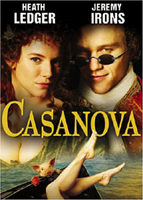 BUY IT AT AMAZON: CLICK HERE!
BUY IT AT AMAZON: CLICK HERE!
STUDIO: Touchstone Home Entertainment
MSRP: $29.99
RATED: R
RUNNING TIME: 111 Minutes
SPECIAL FEATURES:
• Feature Commentary w/ director Lasse Hallstrom
• "Making-of" featurette
• "Dressing in Style" featurette
• "Visions of Venice" featurette
• Extended sequence
The Pitch
"Shakespeare
in Love meets Shakespearian-in-Venice."
The Humans
Heath
Ledger, Sienna Miller, Jeremy Irons, Oliver Platt,
The Nutshell
Giacamo
Casanova: lover, fighter, and unqualified cad. In Inquisition-era
took on a mythological quality in the imaginations of the people. Their plays
portrayed him as a ruthless wooer of women and dogged pursuer of pleasure. Such
dramas hit pretty close to home. Casanova himself (Ledger) gets himself so deeply
entangled in the arms of various lovers that it brings the attention of the
Catholic church, who especially don’t take kindly to his deflowering of the
occasional nun.
As a mode
of rehabilitation — the failure of which means being handed over to the inquisition
for their personal attentions — Casanova is ordered to find a woman to wed
before the festival of Carnivale. The problem is that once he has found a
willing girl, he runs into the one thing he had never expected: a woman to love, in every elevated sense of the
word.
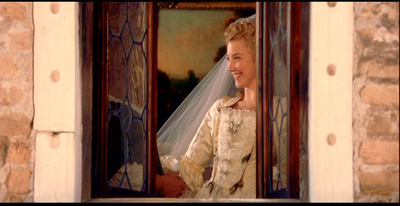
Did you know that most of the great Renaissance artists got their starts as run-of-the-mill window-pervs?
The Lowdown
Lasse Hallström
is one of those reliable directors whose CV is full of mildly successful films
that ride the upward slope of quality. He’s a sentimentalist who has guided
such dramas as Chocolat, The Cider House Rules, and What’s
Eating Gilbert Grape? You could probably find one of his films on the
top ten list of someone in your burg. His name isn’t well-known to your
Johnny-at-the-Blockbuster, though, because he’s an actor’s director, a modest
storyteller who lets the story take precedence over his individual style. Yeah,
I kinda like the guy.
Casanova, however, is probably his least
successful film. He has done family drama, orphan drama, small-town intrigue
drama, but this is a different animal from all those. It’s an Elizabethan
comedy (despite being set almost two centuries post-Elizabeth) with all the
mistaken identity, foiled loves, marriages, and pratfalls that you’d find in a
RSC production of Twelfth Night, but sans
brilliance of character interaction.
The plot may
well recall Shakespeare in its complications, but the dialogue — the necessity
of stage — falls far short. The script, by Jeffrey Hatcher and Kimberly Simi,
veers wildly between faux-Renaissance and modern phraseology, and never settles
down with either. None of it is particularly elegant or deep, and instead of
functioning as an integral part of the storytelling, it becomes a simple
service to a complex plot. The disparity is jarring and kinda messes with the
tone of the whole.
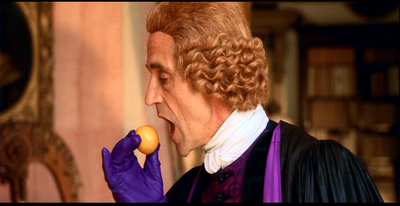
Wokka, wokka, wokka, wokka…
Heath
Ledger, on the other hand, is so perfect in the role of Giacamo Casanova that he
nearly sets the feel of the film all on his own. His Casanova is winking and
clever, possessing a fabricated nobility that measures up decently against the
inherited sort. He reminded me of Jack Shaftoe from Neal Stephenson’s Baroque
Cycle novels; he has the same bloody-mindedness and unwillingness to
face the world on anything but his own terms. It’s not strictly accurate to the
historical Casanova — in fact, it doesn’t even verge on accurate, save that the
whole thing takes place in Venice — so much as an entry into the mythology of
the man, which is discussed within the film.
So,
here’s this great comedic character, but for some reason the script he’s in
tends toward a befuddling combination of drama and comedy. Recall Moulin
Rouge, in which the concepts of love drove some bizarrely hilarious
sequences and some legitimately heart wrenching ones, as well. Casanova
reaches for that heady balance of pure entertainment and heartstring-tuggery, but
doesn’t get the mix quite right. Its structure is completely opposite Moulin
Rouge‘s: in Casanova all the drama is fronted in the first two acts, while
the third devolves into broad comedy.
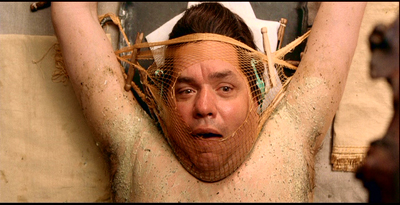
There is a place, in darkest Europe, where people from all over the world
pay good money to torture… Oliver Platt.
And,
unfortunately, neither section pays off particularly well. The dramatic themes
involve feminism and love, but barely scratch the surface of the topics. The
discussion of love is never more compelling than a Sweet Valley High novel, and
the feminist monologues are trite enough to have killed a lesbian or two. The
philosophies are left untouched, which is disappointing because the word
"philosophy" gets tossed around a lot.
The
comedic broadness of the third act just leaves the whole thing feeling rushed
and uneven. The dialogue takes a turn for the anachronistic — think the genie
in Aladdin
and his time-out-of-place references to Caesar, etc. Right about at the
point when a meek young man takes up a sword and is instantly a fighter on par
with Casanova, you ought to feel justified in letting your eyes go on and roll.
The film becomes unapologetically a farce, in the full literary sense of the
word.
In whole,
squishing all three acts together into a conceptual pudding, the movie isn’t entirely
unsuccessful. Hallström has put together a film that feels, in places, to be a
part of the very literary traditions he has placed in the on-screen context. What
drags the movie down is the lack of cohesion, in script, character, and tone. Here’s
the scene that, to me, exemplifies the rough construction of the production:
Ledger and Miller are floating in the basket of a balloon, doing their level
best at reciting hamfisted dialogue about love, while Venice is green-screened
in behind them incredibly obviously.
Casanova is a craftsman slipping with his
hand on the hammer. The result serves its purpose well enough, but fails the
test of the aesthetes.
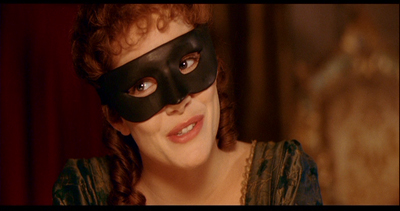
"My husband Diego’s into role-reversal. I’m wearing boxers, too."
The Package
Color and
composition are opulent throughout, and the transfer lives up well to the task
of supporting the artistic eyes of the director and his DP, Oliver Stapleton.
The music is similarly ornate, with plenty of harpsichord flourishes and
Renaissance-flavored orchestrations. There is a DTS 5.1 track, along with a
Dolby 5.1, but the music is the only thing that really benefits from it.
As for
bonuses, you get a few small featurettes: a behind-the-scenes deal, one about
costuming, and one about the set design for the recreation of
the film is impressive, so the latter two featurettes are interesting and
lively.
There is
also an extended sequence from the film, which doesn’t really illuminate
anything new, and a commentary with Hallström. The commentary is erudite and
engaging, and while it fails to add much to the experience of the story, it
does shed a direct light on the amount of detail put into the set dressing and
historical cues.
6.9 out of 10